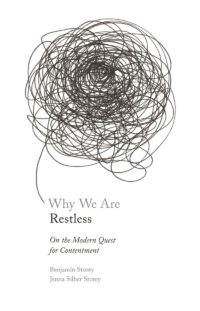A modern restlessness with Renaissance roots
Like many before her, the senior had come to her professors to talk about her future.
She had spent her undergraduate years strengthening her portfolio with internships, study away, Phi Beta Kappa and other impressive achievements. Her plan was to go to law school – or maybe get a Ph.D.
Or maybe, as she told Benjamin Storey and Jenna Silber Storey, a seemingly infinite number of other options. Teaching? Politics? Farming? Travel abroad? Returning home?

“Why We Are Restless” by Benjamin Storey and Jenna Silber Storey
The senior looked “less like a very fortunate person choosing from the bountiful banquet she has earned the right to enjoy than a terminally ill patient choosing from a grim variety of palliatives,” recall the Storeys in the introduction to “Why We Are Restless: On the Modern Quest for Contentment,” published in April by Princeton University Press.
“It was a kind of frenetic paralysis,” says Assistant Professor of Politics and International Affairs Jenna Silber Storey in her office in Johns Hall. “It’s activity without distinctive purpose, when you’re full of motion but you’re not necessarily going anywhere. We chose to call this ‘restlessness.’”
That restlessness, the Storeys say, roils up from our modern conception of what happiness should be.
They first observed it among students, but during the years spent in research and writing, the professors saw restlessness all around them. And while it might seem like a uniquely 21st-century problem, the authors found its roots stretching back to the 16th century, in the works of French Renaissance philosopher Michel de Montaigne.
Montaigne was addressing the idea of the “summum bonum” – humankind’s highest good, what makes life worth living, says Benjamin Storey, the Jane Gage Hipp Professor of Politics and International Affairs.
“People had been arguing about this for thousands of years, and they hadn’t come up with any consensus answers,” he says. “What Montaigne says is, ‘We’re not going to find an answer to this question. We don’t need to. We can just dabble our way to happiness.’”
Instead of finding a single transcendent ideal, Montaigne argued, humankind should focus on “immanent contentment,” finding pleasure and purpose in a variety of tangible worldly pursuits, making oneself happy here and now.
Montaigne’s essays were hugely influential, digested and debated by writers such as Descartes, Freud, Emerson, Darwin and Nietzsche. In “Why We Are Restless,” the Storeys probe in detail the way the ideal of human purpose was discussed over the centuries by three other French philosophers: Blaise Pascal, Jean-Jacques Rosseau and Alexis de Tocqueville, who was renowned for his 19th-century observations of American society.
“What Tocqueville sees when he comes to America is the Montaignean quest for happiness writ large,” says Benjamin Storey. “Americans are trying to dabble their way to happiness. These people are more prosperous, freer, more enlightened than any people the world has produced up to this moment. And nevertheless, they are restless in the midst of their prosperity.”
Which leads to the modern-day dilemma faced by the Storeys’ future law student (or Ph.D. candidate, teacher or farmer). How can people deal with their excess of options, resist distraction and anxiety, and channel their frenetic dabbling into a purposeful intent?
One answer is in what the Storeys call “a genuine liberal education, which is really an education in the art of choosing.”
“That has to begin with taking seriously this question of what a worthy life is,” Jenna Silber Storey says.
When they pose that question to their liberal arts and sciences students at Furman, “we do it in part because we know it makes them jittery,” she says. “They don’t like to rank things. We’re pressing them to think about the various things to which human beings can devote their lives and try to discern among them – what distinct satisfactions and shortcomings each of those kinds of lives has, and which are more choiceworthy.”
Their university is well suited to help students make those discernments, say the professors, who also serve as directors of Furman’s Tocqueville Program.
“Furman is insistent on its identity as an institution that offers a liberal arts education,” says Jenna Silber Storey. “The purpose of the liberal arts is to help you ask the question of what is good, what is worth doing.”
“The heart of The Furman Advantage is being able to sit in small classes with excellent students,” says Benjamin Storey.
“And faculty who want to help you figure things out,” adds Jenna Silber Storey. “We like being faculty at Furman, because you don’t get the chance to work with students as closely at many other colleges.”
“Why We Are Restless” would probably not exist at all if it weren’t for the scholarly environment at Furman, the book’s authors add.
“It allowed us to see a problem that we came to believe is endemic to the modern West right now,” says Jenna Silber Storey. “And it was being here that allowed us to reflect on it – and also to reflect on it with our students.”